There was still no running water in the morning. So I splashed around a little of what was left in the bucket after flushing the toilette, still there wasn't enough to really wash. It would be a deodorant only day…. I was thankful to be able, at least, to change clothes.
We had agreed to meet at the hotel at 08:30 so we could start our Bible Study at 09:30. Armel, Christian and Charles picked me up promptly, I paid my hotel bill ($20), loaded my luggage into the car and off we drove. They told me that they wanted to show me a new conference center that had come to their attention. We drove past the train station and up onto the hill side, took several wrong turns, and finally arrived at the place. It was not quite finished, and chaos inside, but it has potential as a festival site for the future. The view for one thing is very nice.
Then we drove to the train station. On 28 October, during the Feast of Tabernacles a terrible train wreck occurred right in and around the train station. A few days earlier, heavy rains had washed out a bridge on the road between Yaoundé and Douala, the same road we took to reach Eséka. Since the road was cut, more people had to travel by train. The train company added eight additional cars to the nine original ones, which gave the train a capacity of 600 passengers, but about 1300 people crowded in. This may or may not have contributed to the accident, but in any even the train derailed in Eséka, right at the train station. Official reports state 79 people died and 550 were injured. In Eséka everyone told me the death toll was really 800. There was a Reuters journalist on the train who reported on it, so 800 really doesn’t seem possible but Cameroon is extremely fertile soil for conspiracy theories and people always mistrust anything the government says. 79 is bad enough. There are still some of the damaged cars in the station which I wanted to see.
The people keeping the Feast of Tabernacles in Eséka, were not far from the train station. They felt the ground shake and heard the sound of the derailment. Some cars apparently flew up into the air. They, along with everyone else in the town came running, and saw horrible things. Bloodied bodies, wounded and dead, some decapitated. They heard the cries of the wounded in their pain and confusion. Armel arrived back just after the accident, from escorting Lee and Robyn Page to Yaoundé to catch their ongoing flight. He said he met a couple of Americans covered in blood, who begged him to direct them to the hospital. There is not even a pharmacy in Eséka.
It’s easy to understand why this event was deeply troubling in the middle of the Feast of Tabernacles, and the members had to try very hard to focus on the happy news it portends in order to carry on. Some are still troubled to this day, though overall they assured me they were happy and thankful with the way the Feast had gone.
We parked so we could look at the remaining cars; I supposed the worst of them were taken away. I pulled out my phone to snap a couple of photos, and almost immediately a large fellow appeared without any uniform or ID. He said he was with Camrail security, and it was not permissible to take photos. I was not surprised; in these countries, the view is that the news must be controlled as much as possible. So I put my phone away and said I wouldn’t take any more. I suspected we might be stopped, so I had taken as many as I could very quickly, but openly as well so it would be clear I wasn't sneaking anything. We moved on.
We arrived at the house at 09:30, and the day’s meal was hot from the kitchen: macabo, potatoes with onions and small slivers of beef, plantain, and peanut soup as a sauce. I ate sparingly, not being very hungry and waited until everyone had finished. We waited for the ladies to clean up and then I stared by Bible study, once again on the subject of the spirit in man. It lasted not quite an hour, after which there were more questions, including;
- Why does it say in Genesis 5:2 that Adam had a son "in his own likeness after his image" in the same way it speaks of God creating Adam?
- My answer: This passage is underscoring the paternity of God to all men. God made Adam in His likeness and named him (in verse two, the NKJ says God called them “Mankind” but the Hebrew has “Adam”). Adam then had a son in his likeness and named him. This is a reminder that God is the Father of all mankind, and in particular in this context, the righteous line of Seth.
- Why does in only say that about Seth, not Adam’s other children?
- My answer: This section of scripture is showing genealogies, and in particular a righteous line among Adam’s descent. The line of Seth leads to Enoch and Noah, named as righteous men, then from Noah to Shem and on down the line to Abraham, the man on whom God would center the accomplishment of much of His plan. It was Abraham’s family line that God would use for the accomplishment of His will through the centuries. God was their Father.
- What does the Bible say about whom and how Christians should marry?
- My answer: One of the most important instructions is found in 1 Corinthians 7:39, where is says Christians should marry “in the Lord” which we understand to mean within the body of Christ. True Christians are to marry true Christians. There are many other things to say as well: both husband and wife must accept their biblically-defined rolls.
- What if you can’t find anyone in the Church to marry?
- My answer: It’s a matter of faith. If we submit to God’s will, we can have confidence in His blessings and promises. It is a small thing for God to call a soul-mate into His Church, and He has done so many times. It’s a question of trusting God or not, of obeying Him or disobeying so we can arrange things as we see fit.
- What if your boss won’t let you have time off to keep the Sabbath or annual Holy Days?
- My answer: Once again, it is a question of faith. Do we trust God or doubt His word? Is obedience to Him more important that obedience to a human boss? This is a personal question, which each of us needs to answer.
- Why did Jesus suffer so terribly and die, when He could have stopped it?
- My answer: Jesus always did His Father’s will, not His own. It was God’s will and part of His plan that Jesus die in that way to pay the penalty for our sins. Jesus prayed that if it were possible He not have to undergo the crucifixion, but then He prayed that His Father’s will would be done.
- Money is such a problem in the world, where did it come from? Wouldn’t we be better off without it?
- My answer: The Bible says the love of money is a root of all evil (1 Timothy 6:10) not that money is evil in itself. Money is a simply concentrated way to store the fruit of our labor, and make it easily transportable. God told His people to use money to transport their festival tithe to the Feast if the way was long. So there is nothing wrong with money per se. It is the wrong use of money and the inequalities of some economic systems that cause the problems and sufferings.
Then I went back inside for individual discussions. Almost everyone, in fact I believe all the adults, asked to be anointed for one ailment or another: backaches, sore necks, trouble sleeping, malaria, other more personal troubles. Some of the newer people didn’t fully understand what the Bible says about anointing. One man asked for healing and also that the anointing serve as a spiritual purification for him. I explained we only anoint for sickness but that we can certainly pray about other needs. Another asked to be anointed so he could find a job; I explained things more fully to him too. Yet another man asked me to pray with him so he could find a good wife; I was happy to do so.
Two young ladies asked about being baptized, so we started that process. I suggested some booklets for them to read and also some key Bible passages. This was the first time I had met them, and it was encouraging to see their excitement and the start of their commitment.
About 1:00 pm we loaded the car, said goodbye all around and drove out. We reversed our course back to Douala being stopped once again by corrupt “highway safety” agents. It was the same shakedown we had to undergo on the way out to Eséka, and it cost Charles some extortion once again. He assured us his papers were completely in order, but almost anyone in a uniform in Cameroon will find a way to hold victims over a barrel until they cough up the desired sum. This is one of the most corrupt countries in the world.
We finally arrived back at the Ibis Hotel in Douala about 16:30. I unloaded my bags, said goodbye to Charles (who, I might add, had fully participated in all the Bible Studies and had asked his share of questions) and checked in. The air-conditioning and the clean-smelling room felt absolutely luscious.
Two people from Douala were to come meet me in the evening. Everything takes a long time in Douala, so one didn’t arrive until 18:00. We talked for half an hour and agreed to meet again in the person’s home the next day. The second person didn’t arrive until after 19:00. We talked briefly and again agreed to meet the next day to continue our discussion.
The Ibis has a salad bar that is safe to eat, and I plunged in. Raw vegetables are usually not safe to eat in the developing world outside of western level hotels and restaurants. It’s the fault of the water used to wash them, and sometimes the unclean instruments used to prepare them. So after a day or two in the bush, raw vegetables and salads with a vinaigrette are fabulous, something like quail in the desert, I’m sure.
I will attempt to make it an early night tonight because I’ve agreed to meet a local member at 06:30 in the morning

 Douala, Littoral, Cameroon
Douala, Littoral, Cameroon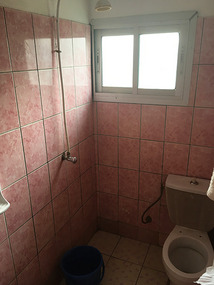
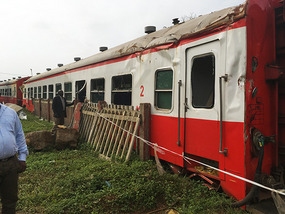
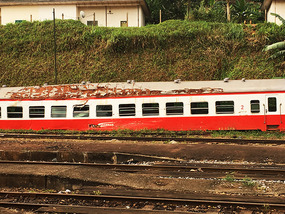
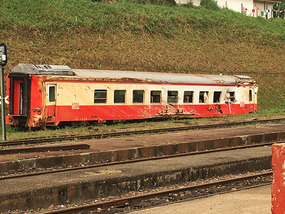
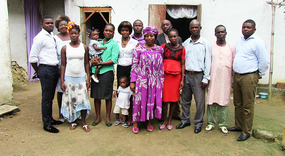
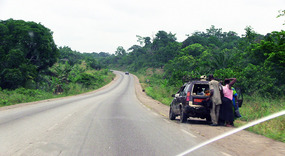






mary hendren
2017-01-25
How frightening to have had a deadly train wreck during the Feast. It must raise questions about safety and responsibility, especially with the corruption you mentioned. On the bright side, it's good to read the Q&A and to read that you've met two new ladies who want to be baptized. There will come a time when all Christians will be able to fellowship without fear.